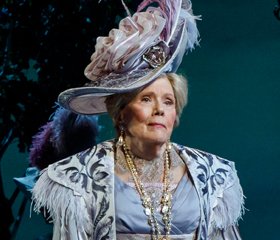During her long, illustrious career in theater, film, and television – a career that I could not begin to encapsulate here – Dame Diana Rigg has been part of casts including everyone from Charles Laughton to Daniel Radcliffe. And yet when rehearsals for My Fair Lady began this past February, Rigg told me the other evening in her dressing room, no past associate was present. (Rigg, who plays Mrs. Higgins, completes her run on September 9th.) “I was walking in to a rehearsal room filled with a great many people, not one of whom I knew. I’d met Bart” – Bartlett Sher, the production’s director – “once in London and that was it.”
It didn’t take Rigg long to enter into the company fellowship. My Fair Lady not only afforded her a chance to appear again in New York (for Medea, her previous Broadway appearance, she won a Tony), and to work in theater, which she said has “always been my greatest pleasure,” but to be part of a large ensemble. “There’s a great camaraderie in a musical that I don’t think you find so much in a straight play.”
Her last stage musical was Sondheim’s Follies, in London, thirty-one years ago. She played Phyllis Rogers Stone. She didn’t make specific comparisons between actors in Follies and My Fair Lady, but did talk about the differences in stage managers. In New York, she said approvingly, they not only run the show but “do a kind of social service as well. They have Thirsty Thursdays and Dollar Friday” – weekly events for cast and crew that involve refreshments or betting pools. “That kind of thing doesn’t exist in London or in England, and it’s a very good measure for bonding a company.”
Rigg’s desire to sing praises for the under-sung relates to her own career. “As I have told Lisa” – Lisa Ann Chernoff is My Fair Lady’s 1st Assistant Stage Manager – “I was an ASM way back when. For several productions, during my time in rep.”
Rigg added: “In those days I was also playing small parts. So I would be in the prompt corner, in costume, with the prompt book on my lap. And I’d have the board to my right where I’d put a switch on for ‘stand by’ or ‘go.‘” Behind Rigg was a turntable with a disc. “You’d put the arm onto the sound effect as it was needed. When it came time to play my part I’d hand my book over to somebody and do my part and then come back. At the end of the play, I stood up and pulled the rope for the curtain.”
“I did the odd mistake in sound cues. There was an Agatha Christie play and I was supposed to play ‘The Ride of the Valkyries’ at the end of the first act.” Instead, Rigg played a number by Jimmy Shand, a well-known Scottish musician whose signature tune was “The Bluebell Polka.” “I got very, very black looks from the entire cast.”
Another part of Rigg’s ASM assignment was the handling of props. “I remember when I was in Chesterfield, and Ronald Harwood – he wrote the screenplay for The Pianist and won an Oscar for it – was living in the prop room with his girlfriend. I had to knock on their door every time I wanted a prop. But it was fun! I had nowhere to go but up.”
Rigg and I returned to My Fair Lady in order to talk about an essential reason why she loves live theater: the audience. “At the risk of sounding irreligious or pompous I think a performance is a communion. The audience come to believe, and it’s our duty and honor to fulfill that belief as best we can.”
Have the My Fair Lady audiences been believers? “I can only say that they come to this prepared to enjoy it. I think New Yorkers believe that My Fair Lady belongs to them because it premiered here all those years ago and was given the seal of approval by them. They’re delighted that it’s back.”
Sometimes too delighted. “The other day we had one lady who was enjoying the performance so much that she was singing along with the cast. Which was not entirely welcome.”
Rigg’s leave-taking may be imminent, and before going back home to London she may be attending the Emmys, in Los Angeles. (She is the bookies’ favorite to win Outstanding Supporting Actress in a Drama Series, for her work as Olenna Tyrell in “Game of Thrones.”). I myself cannot take my leave here before remarking that in 1974 Rigg played Eliza in a London production of Pygmalion.
“I think the play,” she remarked, “is Shaw’s best piece of work. Bart incorporated a great deal more of it than is normally done. And rightly so because that gives the thing more weight. The more of it you have the better to flush out the songs. I think what Bart did is wonderful.”
Brendan Lemon is the editor of lemonwade.com
